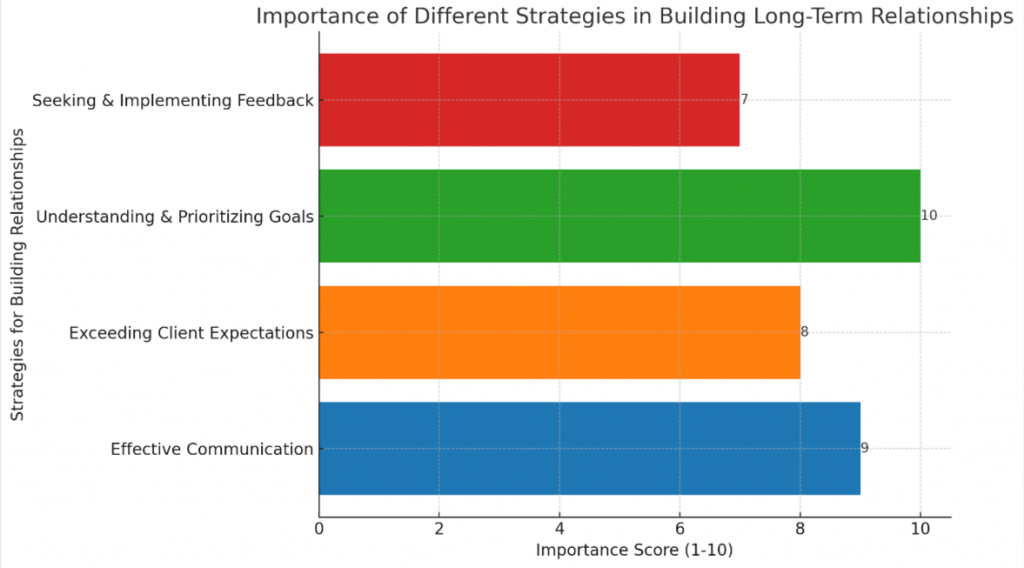Fostering Professional Bonds: Strategies for Long-Term Industry Relationships
Finding ways to foster long-term relationships in your industry can seem like a daunting task. Yet, studies show that maintaining existing customer relationships is far more cost-effective than acquiring new ones.
This article will guide you through effective strategies and practical steps to build strong, sustainable connections within your field. Ready for some relationship-building wisdom?.
Key Takeaways
- Effective communication is essential for building long – term relationships in the industry.
- Exceeding client expectations can solidify strong and lasting industry relationships.
- Understanding and prioritizing the goals of others is crucial for fostering trust and mutual respect.
- Seeking feedback from clients and implementing necessary changes helps build stronger relationships.
The Importance of Long-Term Relationships in the Industry
Long-term relationships in the industry are paramount for building trust with clients. This mutual understanding not only fosters a positive and open-minded business environment but also saves clients time and money.
It allows businesses to focus on project progress and achieving business goals rather than continually starting fresh with new stakeholders.
A dependable, successful performance is often the outcome of nurturing such relationships. Openness, effective communication, consistency, and a positive attitude are among the key elements that drive these alliances forward.
The knowledge sharing involved in these interactions ultimately benefits both parties involved by providing valuable insights into each other’s objectives or challenges.
Companies also reap significant rewards from re-engaging independent talent they have worked with before. Not only does this approach save resources; it also streamlines project interests because of shared experience.
Businesses need to understand their client’s goals thoroughly, adapt their communication style accordingly while maintaining professionalism and humility throughout all processes.
Businesses striving towards long-term customer relationship must show up consistently for their clientele – exceed expectations where possible, implement feedback received diligently while displaying a positive and friendly tone always.
Such efforts accentuate how much value is placed on these associations thereby fortifying foundations of trust which lead to increased brand loyalty.
Employee relationships too play an integral role within any organization seeking exponential growth as happy employees ensure happy customers through excellent service delivery! Keeping track of customers through employees who treat clients individually can massively boost customer-centricity leading to higher lifetime values per customer achieved simultaneously reducing chances of churn rates shooting up unnecessarily!
Even tools devised specifically for relationship building should be utilized effectively like advanced Customer engagement tools delivering real-time support alongside CRM systems that help manage various aspects related to managing customer demands efficiently saving precious time & effort helping businesses along their path towards success!
Effective Ways to Build Strong Industry Relationships
Open and consistent communication is key to building strong industry relationships.
Open and Consistent Communication
Open and consistent communication forms the cornerstone of building long-term relationships in any industry. In a dynamic business landscape, independent talent and organizations must prioritize timely and efficient exchanges of information with their clients.
This promotes transparency, keeps all parties in sync about project progress, and increases trust.
Clear communication also opens up avenues for knowledge sharing. Clients appreciate gaining insights into professional expertise that enhances their understanding of projects. Businesses need to adapt flexible communication styles aligned with client preferences for successful performance.
An open-minded approach paired with honesty when expressing professional opinions fosters mutual respect while strengthening client relations further.
Exceeding Expectations
Consistently exceeding client expectations can solidify long-term relationships in the industry. It is about going beyond simply fulfilling obligations and delivering on promises made during project initiation.
This behavior not only adds value to customer interactions but also fosters trust, a crucial element for building strong client relationships. Moreover, it shows clients that you are committed to their success – this attribute often prompts them to re-engage your services, ultimately saving time and money for both parties involved.
However, expectation management requires understanding clients’ goals through effective communication and consistent follow-up throughout project progress. Displaying such professionalism boosts brand loyalty which can lead to exponential growth of businesses.
Understanding the Goals of Others
Understanding the goals of others is a crucial part of building relationships in any industry. This involves delving into what clients hope to achieve on both micro and macro levels.
Strong relationships are fostered as you show clients that their ambitions matter to you, encouraging open and honest communication. To comprehend objectives effectively and alleviate miscommunication risks, adjusting your approach to match a client’s preferred methods of dialogue may be beneficial.
Demonstrating an understanding of their aims not only builds trust but also displays mutual respect which ultimately strengthens the bond between parties involved.
Seeking and Implementing Feedback
Consultants should actively seek feedback from their clients to improve their services and build stronger relationships. By asking for feedback, consultants show that they value their client’s input and are committed to delivering a high-quality experience.
Furthermore, implementing feedback demonstrates the consultant’s willingness to adapt and make changes based on the client’s needs and preferences. This collaborative approach fosters trust, encourages open communication, and ultimately leads to better outcomes for both parties involved.
Staying Humble and Positive
Building and maintaining long-term industry relationships requires more than just professional expertise. It also involves staying humble and positive throughout your interactions with clients.
By adopting a positive attitude, you can create a welcoming environment that fosters trust and open communication. Additionally, acknowledging clients as individuals and showing genuine interest in their personal lives can strengthen the bond between you.
Being humble allows you to listen actively to client needs and concerns, while maintaining a positive demeanor ensures that your interactions are pleasant and productive. These qualities will help you build strong industry relationships based on mutual respect and collaboration.
In order to stay humble and positive, it is important to maintain openness and honesty in expressing your professional opinions. This not only shows integrity but also demonstrates that you value the input of others.

The Role of Customer Experience in Relationship Building
Creating value for customers, ensuring a positive customer experience, and being transparent are key elements in building strong relationships with customers.
Creating Value for Customers
Adding value to customers is essential for building strong and long-lasting relationships. By tailoring our offers and understanding their unique needs, we can provide solutions that go above and beyond what the competition offers.
Showing empathy and care in our branding and communication helps create a positive brand perception. Moreover, meeting customers’ wants and needs on their terms is crucial for maintaining their loyalty.
Consistently exceeding their expectations reinforces trust and professionalism, which are key factors in building lasting relationships with customers.
Ensuring a Positive Customer Experience
Building and maintaining strong client relationships goes hand in hand with ensuring a positive customer experience. One important aspect of this is creating value for customers by delivering on promises and exceeding their expectations.
Timely and effective communication also plays a crucial role, as it allows for transparency and problem-solving in real time. Additionally, being responsive to customer needs, providing excellent customer service, and showing appreciation through incentives or rewards can help foster a positive brand perception and increase customer loyalty.
By prioritizing the satisfaction of customers, businesses can build long-term relationships that are mutually beneficial for both parties involved.
Being Transparent with Customers
Transparency is a key aspect of building strong and long-lasting relationships with customers. When businesses are open and honest about their processes, decisions, and even challenges, it helps to establish trust.
By sharing information about project progress, timelines, and any potential roadblocks, customers feel involved and informed throughout the entire process. This transparency also allows for better communication and collaboration between both parties.
Additionally, being transparent with pricing structures and any changes in costs or fees further enhances trust with customers. It shows that the business values honesty and wants to build a relationship based on openness and integrity.
Moreover, transparency goes beyond just sharing information; it also involves being upfront about capabilities and limitations. By clearly communicating what can be achieved within a given timeframe or budget, businesses can manage customer expectations effectively.
Honesty regarding expertise or areas where additional support may be required ensures that clients have realistic expectations from the start. This level of transparency fosters positive experiences for customers by avoiding surprises or disappointments along the way.
The Importance of Employee Relationships in the Industry
Treating employees right and empowering them is crucial for building strong industry relationships. Discover how employee relationships contribute to business success. Read more here!
Treating Employees Right
Treating employees right is crucial for fostering trust, loyalty, and productivity. When employees feel valued and supported, they are more likely to go above and beyond in their work.
By investing in employee development opportunities, providing a positive work environment, and recognizing their contributions, businesses can create a culture of respect and appreciation.
Timely and efficient communication with employees is also essential for building strong relationships. Clear expectations should be set from the beginning of projects and consistent feedback should be given throughout.
Empowering Employees
Empowering employees is a crucial aspect of building and maintaining strong client relationships. By giving employees the authority and autonomy to make decisions and take ownership of their work, they feel more invested in the success of the project.
Timely and efficient communication with clients is also key in empowering employees. Keeping clients informed every step of the way not only builds trust but also allows employees to have a clear understanding of expectations and deadlines.
Furthermore, sharing knowledge with clients helps empower employees by demonstrating their expertise and creating a stronger connection to the project. Consultants should maintain openness and honesty in expressing their professional opinions, which empowers employees in the decision-making process.
Keeping Track of Customers through Employees
Maintaining strong relationships with customers requires more than just direct communication. It’s important for businesses to keep track of customers through their employees. By empowering and training employees to understand customer goals and preferences, businesses can ensure that they are providing personalized and tailored experiences.
Employees play a vital role in gathering feedback, identifying opportunities for improvement, and delivering exceptional customer service. With the right tools and systems in place, businesses can effectively track customers’ needs and create long-lasting relationships based on trust and satisfaction.
Acknowledging clients as individuals strengthens relationships by showing genuine interest
Utilizing Tools for Relationship Building
Implementing Customer Support Software to streamline communication and provide quick resolutions for any customer issues.
Using Advanced Customer Engagement Tools
Advanced customer engagement tools are essential for building strong relationships in the industry. These tools provide real-time assistance and personalized solutions, ensuring a positive customer experience. Here are some examples:
- Co-browsing: This tool allows you to navigate websites with your customers, providing them with step-by-step guidance and resolving any issues they may encounter.
- Video chat: Through video chat, you can have face-to-face interactions with your customers, creating a more personal connection and addressing their concerns in real-time.
- Newsletters: Sending out regular newsletters is an effective way to stay connected with customers. You can provide valuable content, updates on new products or services, and exclusive offers to keep them engaged.
- Customer support software: Implementing customer support software helps track customer needs and monitor satisfaction levels. It enables effective communication and problem resolution by keeping all relevant information in one place.
- Self-service options: Empower your customers by offering self-service options like knowledge bases and chatbots. This allows them to find answers to their questions or solve problems on their own, saving time for both parties.
- Personalization: Utilize tools that allow you to personalize your interactions with customers. Address them by name, tailor your messaging to their interests or previous purchases, and send personalized recommendations based on their preferences.
Implementing Customer Support Software
Implementing customer support software is a crucial step in building long-term relationships with clients in the industry. By using this type of software, businesses can streamline their customer support process and provide timely and efficient assistance to their clients. Here are some benefits of implementing customer support software:
- Improved response times: Customer support software allows businesses to manage customer inquiries and tickets in a centralized system. This makes it easier to prioritize and respond to customer queries promptly, leading to improved response times.
- Enhanced customer satisfaction: With customer support software, businesses can track and monitor the progress of each customer inquiry. This ensures that no request slips through the cracks, providing a better experience for customers and increasing overall satisfaction.
- Efficient ticket management: Customer support software enables businesses to organize and categorize customer inquiries into tickets, making it easier for employees to manage and resolve issues efficiently. This helps save time and ensures that all customer inquiries are addressed promptly.
- Knowledge base integration: Many customer support software solutions offer integrated knowledge bases where businesses can store frequently asked questions, troubleshooting guides, and other helpful resources. This allows customers to find answers to common queries on their own, reducing the need for repetitive inquiries.
- Analytics and reporting: Customer support software often provides robust analytics and reporting features that allow businesses to track key metrics such as response time, resolution rate, and customer satisfaction scores. These insights help businesses identify areas for improvement and make data-driven decisions.
- Seamless collaboration: Customer support software enables teams to collaborate effectively by assigning specific tickets or tasks to team members, adding internal notes for context, and sharing information seamlessly. This ensures a smooth workflow within the organization when resolving client issues.
Utilizing CRM Systems
Utilizing CRM systems is essential for effective relationship building in the industry. To build strong connections with clients and customers, consider the following strategies:
- Implementing advanced customer engagement tools
- Utilizing customer support software
- Employing CRM systems
Conclusion
Building long-term relationships in the industry is essential for business success. By consistently communicating, exceeding expectations, and understanding the goals of others, you can foster trust and loyalty with your clients.
Additionally, prioritizing customer experience and employee relationships, utilizing relationship-building tools, and continuously adding value to customer interactions will help solidify long-lasting partnerships in your industry.
Embrace these strategies to cultivate lasting connections that drive growth and mutual success.

